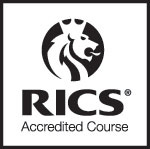MSc Quantity Surveying
Please note we are no longer offering this course to new applicants
Page last updated 18 June 2024
Introduction
This professionally accredited course gives you the technical knowledge and skills to become a highly employable Quantity Surveyor and member of the Royal Institution of Chartered Surveyors (RICS).
The MSc Quantity Surveying course is for graduates with a minimum of three years' professional experience or a qualification in a closely related discipline.
Learn flexibly
This course is for those who aspire to become Chartered members of the Royal Institution of Chartered Surveyors. The course is designed to offer varied and flexible patterns of study, so you can fit studies and experience around your personal and professional commitments. It reflects and addresses the needs of professional practice and helps you develop the skills and knowledge to become an effective professional surveyor in the construction industry.
You'll follow the RICS accredited route as a Quantity Surveyor. The course is academically challenging, and encourages independent, analytical and reflective thought and judgement that applies equally to the workplace and professional ethics.
You'll also develop a range of transferable skills, such as investigation, problem-solving, logical and systematic data analysis, information management, sustainable decision-making and effective communication.
Watch: The learning and teaching experience
Structure
Content
We introduce you to skills and knowledge in construction technology, measurement, law, economics, procurement and contract management, in the Pre-Enrolment Reading.
You then develop your core skills at Level 3 and specialist knowledge in the M-Level modules.
Level 3
You'll study:
- Commercial Management (30 credits) - The module is designed to equip you for the contractual, financial and time management of projects during the pre construction and construction stages, primarily from the contractor's point of view. The commercial considerations are important if the project is to be a success and the contractor is able to work together profitably with a client in a win-win situation.
- International Cost Management (30 credits) - This module has been developed to provide a distinctive study of core quantity surveying competences and is designed to develop practice skills and techniques and application of knowledge in a realistic, practical context. The module has an emphasis on an international perspective, but also covers civil engineering measurement in accordance with the RICS Rules of Measurement.
Level M:
You'll study:
These modules examine current advanced-level practice in detail and reflect on the latest initiatives. They draw on the expertise of leading industry practitioners as visiting lecturers and speakers. We encourage you to develop coursework based on your own work experience.
- Construction Procurement and Law (15 credits) - This module will equip you to make informed decisions about risk apportionment, procurement method and contract strategy. You'll also study the legislative context of contracts, the framework and impact of other areas of law (including some international aspects) and the various means for resolving disputes.
- Construction Project Management Practice (15 credits) - Here you integrate project manager skills and practice, by focussing on a case study of a project and analysing the environment, client objectives, feasibility, strategy and implementation of the project.
- Dissertation (60 credits) - This is aimed at giving you the valuable experience of advanced independent enquiry, working at the boundaries of current knowledge, and linked to research expertise within UWE Bristol. You'll submit a research proposal and present it at a progress seminar before completing a 16,000-20,000-word dissertation.
- Modern Methods of Construction (15 credits) - The module extends a basic appreciation of construction technology and environmental science principles from traditional construction to modern methods of construction (MMC). You will be looking at efficiencies and smart project delivery through MMC, which are key to secure a sustainable built environment and a net zero carbon future.
- Project Management Principles (15 credits) - This module introduces the concept of project management and some of the ways in which it is being applied today in construction and other sectors of the economy. Project management is also now being developed in new areas such as computing and banking and it is within this shifting context that this module seeks to challenge your existing views of the subject.
The University continually enhances our offer by responding to feedback from our students and other stakeholders, ensuring the curriculum is kept up to date and our graduates are equipped with the knowledge and skills they need for the real world. This may result in changes to the course. If changes to your course are approved we will inform you.
Learning and Teaching
Teaching methods vary depending on the module, but typically include lectures, project work and tutorials. We encourage 'formative work' to prepare for assessments this is not credited, but gives you valuable feedback to help improve your performance.
Support is available if you have difficulties with numeracy, IT, literacy or study skills. Our staff provide a friendly, enabling environment for learning. They are also actively engaged in research or professional practice, ensuring you learn directly from the latest academic and business developments.
The course is also supported by a group of employers who contribute towards resources used in teaching, offer sponsorship and placements to students, and are keen to employ UWE Bristol graduates.
Find out more about our construction partner employers.
For more details see our glossary of teaching and learning terms.
"I have found UWE a fantastic place to study on a part-time basis and feel that all of the resources and teaching input along the way has been second to none." Tom, Quantity Surveying graduate.
Study time
The course is studied full-time over one academic year plus up to six months to complete the dissertation, or part-time over two academic years plus up to six months to complete the dissertation. It is also possible to defer modules and take them over a longer period if necessary.
Assessment
We assess you through a combination of written examinations, coursework, projects, presentations and case studies. Because of the importance attached to presentation and collaboration skills, up to 25% of assessment is through oral presentation and group work.
For more detail see our full glossary of assessment terms.
Features
Professional accreditation
The MSc in Quantity Surveying is fully accredited with the Royal Institution of Chartered Surveyors (RICS) to provide acceptance on the Assessment of Professional Practice, and qualification as a Chartered Quantity Surveyor.
It's also accredited as meeting all the requirements of the Chartered Institute of Civil Engineering Surveyors (CICES). This is an important quality assurance standard and shows the career opportunities available when you've successfully completed the course.
Study facilities
One of our main aims is to foster an active graduate community, bringing together postgraduates on taught courses and research students.
You have a dedicated space on the main campus, with teaching rooms and informal areas, and Student Advisors for pastoral support and advice.
We provide well-equipped laboratories for concrete and environmental services, environmental physics, earth sciences, spatial analysis (including mapping and Geographical Information Systems) and surveying technology. These are all supported by specialist technicians. An audio-visual group provides support for photography, digital imaging, filming and sound recording.
The Department has invested significantly in computer-based resources to support modules especially those available through distance learning. The UWE Bristol library gives you 24/7 access to a vast number of journals and databases, and many computer labs are also open around the clock. The department's suite of computer rooms supports software for word processing, data analysis, spatial analysis, computer-aided design and other specialist software.
Find out more about the facilities and resources UWE Bristol has to offer.
Take a Virtual Tour of the Construction, Property and Surveying facilities and see what's on offer here for you.
Life
Postgraduate support
Our support includes access to fantastic facilities, study tools and career consultants, plus practical help to access everything from funding to childcare.
Bristol
A stunning city for student living with all the qualities to make you want to stay.
Sports, societies and activities
There is more to your experience here than study. Choose to make the most of it and try new things.
Health and Wellbeing
We provide support in the way you need it.
Campus and facilities
Discover our campuses and the wealth of facilities provided for our students.
Careers
Careers / Further study
On graduation, you'll be well equipped to meet the challenges posed by changes to the quantity surveying profession and the wider construction industry and to exploit the opportunities these changes offer.
Our award-winning Careers Service helps you develop your employment potential through career coaching, a vacancy service for internships, placements, jobs, global opportunities, volunteering and community activity plus support for entrepreneurial activity, and access to employer events.
Fees
Full time course
Part time course
Supplementary fee information
For information on fees, managing your money and determining your fee status, please go to our fees and funding pages.
For information about funding options visit our postgraduate funding and scholarships pages.
Entry
Entry requirements
We normally require an honours degree of 2:2 or above in Quantity Surveying, Construction Management, or a closely related subject.
You also need two years' professional experience in Construction, which you should outline in your application.
UWE Bristol's International College
If you're an international student and you don't meet the academic or English language requirements to study this course, you can qualify by completing preparatory study at our International College.
English language support
If you meet the academic requirements but require additional support to take your language skills to the required level, you may be able to attend one of our pre-sessional English courses. Students who successfully complete the pre-sessional course can progress onto their chosen degree course without retaking an IELTS or equivalent.
Read more about our Pre-Sessional English Programme.
English Language Requirement
International and EU applicants are required to have a minimum overall IELTS (Academic) score of 6.5 with 5.5 in each component (or approved equivalent*).
*The University accepts a large number of UK and international qualifications in place of IELTS. You can find details of acceptable tests and the required grades you will need in our English Language section.
How to apply
Read more about international applications and key international deadline dates.
For further information
- Email: admissions@uwe.ac.uk
- Telephone: +44 (0)117 32 83333


